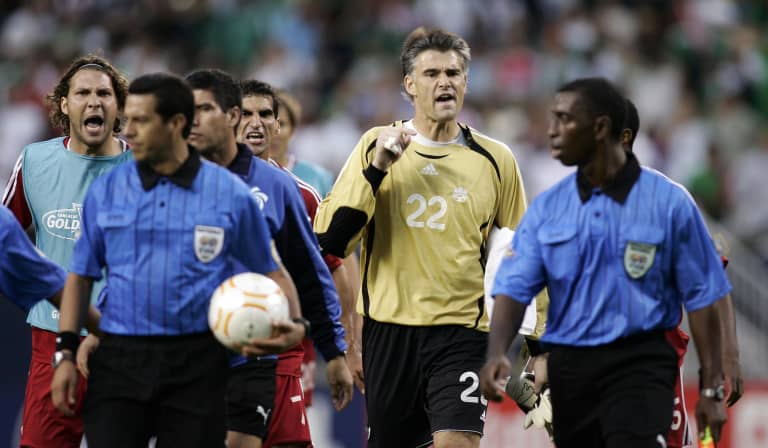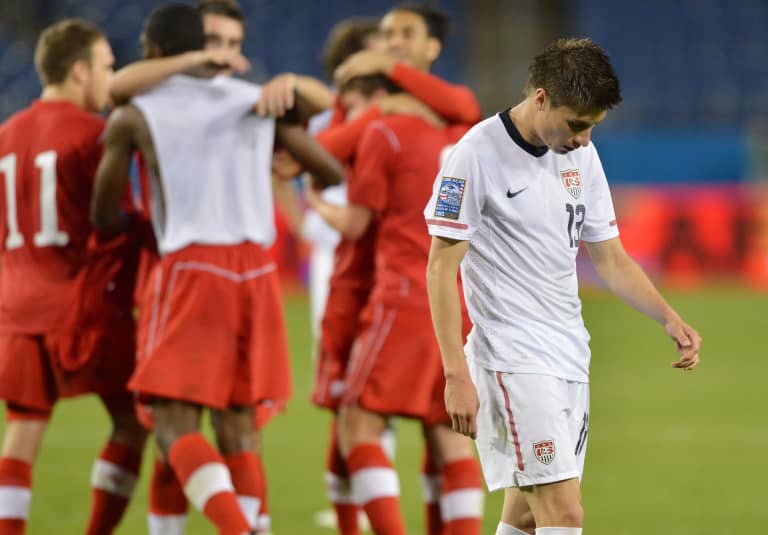While it may not have the impact of USA-Mexico, the rivalry between the Yanks and Canada has certainly had its moments. Ahead of Friday's matchup between the North American neighbors (10:15 pm ET; FS1, UniMas, UDN in the US, TSN in Canada), MLSsoccer.com's Matthew Doyle and Daniel Squizzato take a look at the series' highs and lows from three significant games in their own, unique perspectives.
2007 Gold Cup semifinal
Squizzato (Canada): When it comes to conspiracy theories, Americans have the Zapruder film, the moon landing and Barack Obama’s birth certificate. Canadians have this game.
All the ingredients were there: The big, bad Americans as opponents. The referee, Benito Archundia, who’d made a couple of dubious decisions against Canada in a World Cup qualifier back in 2004. And, of course, our natural inferiority/victim complex, that permeates any strain of existence that doesn’t involve ice skates and a slab of rubber.
Perhaps most infuriating about the final outcome was that this wasn’t some slapdash collection of nobodies, punching above their weight—this Canadian team was actually good. Dwayne De Rosario was demolishing MLS, Julian de Guzman was blazing new trails in Spain, Paul Stalteri was a rock solid presence in England, Atiba Hutchinson was a rising star in Denmark, and so on.
And while #AtibaWasOnside remains, to Canadian fans, a self-flagellating reminder of that generation’s unfulfilled potential, the sentiment is also—it must be said—indisputably correct. As in, the call was wrong. Hutchinson was onside, and the goal should have counted.
Now, in the outer reaches of the multiverse, where the assistant referee’s flag stayed down, maybe Canada still lost the game in extra time, or in a penalty shootout. So perhaps, in a bizarre way, the quickly-raised flag of an exhausted sideline official from Suriname did Canadian soccer fans a favor, in the long run.
The bitter result remains a rallying point to this day, a signifier that we could be the regional power we dream of being, if not for those meddling (insert malevolent external factors here). The truth is, of course, that there was no conspiracy, no grand plan to deprive Canada of its spot in the final. It was just bad luck.
Long-time commentator Gerry Dobson put it best: “Unbelievable, the way it happens time in and time out for this Canadian team.”

Doyle (USA): I’m not even sure I really remember this game. Who was it against? Really? Canada had a team that actually won some games? I’ll be damned…
OK, that’s disingenuous on my part, because I remember this game very, very well. It was the definition of what Sir Alex Ferguson called “squeaky bum time,” and basically the entire experience was unpleasant. Canada hit the post early, they stayed compact in defense from the run of play, and Landon Donovan conjured the most spectacular miss of his career. Pat Onstad was generally commanding off his line (save for, you know, conceding a PK after Michael Bradley sent DaMarcus Beasley through with an exquisite left-footed through ball), and most worrying was that this Canada team actually played some pretty damn good soccer.
That’s the thing I don’t get about Canadian soccer in the 8.5 years since this game. There was so much talent to build upon and create sustained success. The US did it – Bradley, Beasley, Donovan, Tim Howard, Clint Dempsey and others formed the backbone of the 2010 and 2014 World Cup qualifying campaigns. Canada didn’t have quite so much to draw from, but the guys they did have should’ve been enough for them to be serious players in CONCACAF for the next four or five years.
They, of course, weren’t. But on that day at Soldier Field, even when they went down 2-0 Canada were able to take their time, string passes together and stretch the US out. Ali Gerba was a menace up top (I still can’t believe he didn’t have a long and distinguished MLS career), and the midfield was skillful and dogged on both sides of the ball. When Iain Hume made it 2-1 in the 77th minute, it felt like the equalizer was coming.
But it didn’t, because it was clearly offside. USA! USA! USA!!!!
Nov. 9, 1997
Squizzato: At the turn of the century, Malcolm Gladwell popularized the idea of the “tipping point”, the moment at which discrete events coalesce into a broader social phenomenon. Unbeknownst to Canadian soccer fans, this game may have represented the men’s national team’s tipping point—and not in a good way.
Canada was at the 1986 World Cup, and had come within a whisker of the 1994 tournament. Now, here we were again, in the final stage of regional qualifying (the newly-created “Hexagonal” round), with France 1998 potentially within our grasp.
Of course, it wouldn’t pan out that way. Canada ended up finishing last in its only appearance in the Hex, with this home loss against the US officially eliminating the team from contention. And though Canada’s surprising victory at the 2000 Gold Cup did provide some measure of glory, the ship had sailed when it came to the team regularly challenging for a spot in FIFA’s biggest tournament.
Canada hasn’t played a home game in the Hex since Nov. 9, 1997, while the Yanks have appeared in every World Cup since then. Given that the author of The Tipping Point enjoyed his greatest success after moving from Canada to the U.S., perhaps soccer fans up north should do what so many others do – blame Malcolm Gladwell.
Doyle: There’s a bit of trivia I turn to whenever anybody marginalizes soccer in the US. Here it is:
Only nine countries have made four of the last six World Cup knockout rounds, and only eight have made three of the last four. The US are included in both groups – elite company that speaks to consistency and consistent growth.
Added to the above: the US are one of only seven teams to qualify for the last seven World Cups. Again, this is elite company.
But that’s not totally on the level, because the US didn’t really qualify for the 1994 World Cup – we hosted it. Hosts are given a spot, and that’s that. And in 1990, when we did actually qualify, the entire region was helped by the Cachirules Scandal and Mexico’s subsequent ban.
So we had qualified, but we’d done it without the group heavyweight.
Thus, the 1998 Hexagonal was the first non-asterisk’ed qualification attempt, and things weren’t going so great. The US were tough to beat, but at seemingly every step of the way Steve Sampson’s team had found a way to shoot themselves in the foot.
And then they didn’t. Claudio Reyna gave the US a 1-0 lead in the 5th minute at Swangard Stadium, and Roy Wegerle salted it away with two late goals. The 3-0 scoreline was deserved, and the US had qualified for France ’98.
We take it for granted now (quick, can you name the qualifier which officially put the US into Brazil 2014, or South Africa 2010?), but back then we didn’t. That win really was, in its way, the start of something great.
2012 Olympic qualifying
Squizzato: You need to go back in time 30 years for a Canadian win at the senior level, but only four years at the Under-23 level! It must mean the future is bright for Canada and hazy for the Americans! Finally!
Our two goal-scorers on the day, Doneil Henry and Lucas Cavallini, would go on to be two of the brightest stars coming out of that team… except that Henry’s been out of commission for a year due to injury, and Cavallini has taken a “LOL nope” approach to national-team play for most of the last three years.
And while the victory was delightful and inspiring on the day, an analysis of how the rosters of the two sides have fared since then makes this Olympic qualifier even more of a remarkable upset.
It may have ultimately been a Pyrrhic victory, though, as Canada expended all of its upset juice against the Yanks and had none left against Mexico in the do-or-die semifinal. But hey, the Americans didn’t qualify for the Olympics either! We took ’em down with us! STAND ON GUARD!

Doyle: Ask any truly hardcore US fan to name their greatest disappointments over the last 20 years and the 2012 Olympic qualifying campaign will show up on the list.
This was supposed to be Freddy Adu’s great coming-out party as a true playmaking force, and Mix Diskerud’s bows as a midfield hub capable of controlling a game. This was supposed to be Joe Gyau streaking down one flank and Jorge Villafana bombing up the other. This group was supposed to be the one that played attractive attacking soccer, led by a young and hungry and homegrown coach in Caleb Porter.
But none of it really worked. The US were fixed almost dogmatically to a 4-3-3 that Canada neutralized by playing a 4-3-2-1 “Christmas Tree” formation, clogging up the midfield and shutting down anything from the US creators. “Possession without purpose” was the order of the day from the US, while Canada were happy enough to defend deep and attack either on the counter or set pieces.
That plan was perfect, of course. Canada deserved their 2-0 win, and the US collapse was completed a few days later with a memorably horrible 3-3 draw against El Salvador. While Porter’s bounced back, not a single player from that US group has been able to break through and become a starter with Jurgen Klinsmann’s national team.












